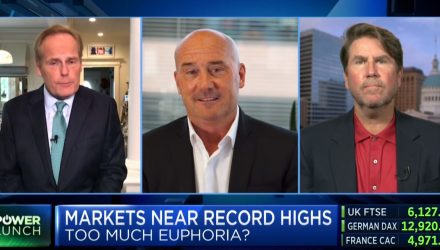As markets arrive near record-high levels, is that too much excitement to ask for? Tom Lydon, ETF Trends CEO, and David Rolfe, Wedgewood Partners CIO, spoke on CNBC’s “Power Lunch to discuss the state of the markets, including the role of small businesses and leveraging high gold cost.
Putting the excitement aside, Lydon is asked whether the market is correctly valuing the economic performance that can be expected from reasonable people. He notes how, looking at trends, one can see the upside currently. The market is presently in a risk-on environment and on pace for a record year of flows in ETFs (over $400 billion).
That in mind, Lydon does state how there’s something of a bifurcated market going on. For example, the SPDR S&P 500 (SPY), the biggest ETF, is currently losing $23 billion in assets, while the Invesco Nasdaq 100 ETF (QQQ) is up $12 billion. This shows that more people are putting money in areas like technology and communications while staying away from things like energy and banks.
Lydon continues, “From a valuations standpoint, people take that into account, however, when you buy into index ETFs, there’s no manager that’s making sure you’re buying on dips or buying the right valuations. At this point, American investors are saying they want in.”
Lydon then explains how 66% of the GDP is based on small businesses, and all small businesses have had to change. To succeed, they’ve had to embrace technology, communication, online purchasing, and cloud computing.
“All of these companies are pretty much in line with that, and their growth rates are exacerbated by what’s going on in this economy. The Nasdaq 100 embraces that,” Lydon states.
Gold Leverage
Moving on to gold, Rolfe goes over how smart a play it is to have the precious metal occupy a small percentage in an investor’s portfolio. As far as Rolfe is concerned, it’s less about the gold and more about the companies that can have a business model that can leverage the higher price of gold via a fixed-cost expense where there will be continued operating leverage.
“From an economic business point of view, that makes more sense to me than speculating just on the price of the metal,” Rolfe adds.
For more market trends, visit ETF Trends.
